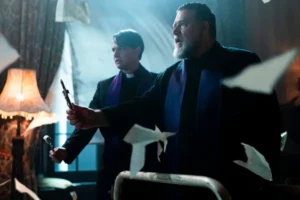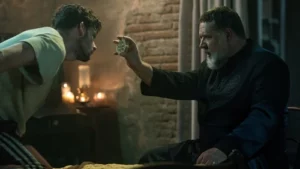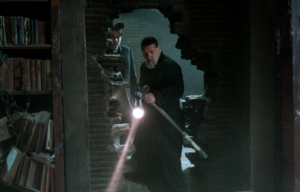Publication Date: 04-14-2023
The Pope’s Exorcist (2023) review
Dir. Julius Avery
By: Steve Pulaski
Rating: ★★★
It seems I haven’t enjoyed an exorcism movie since Jesus Christ lost his sandals. Perhaps it was the most recent installment of The Conjuring, if you want to count that. I’ve avoided many films of the genre due to their largely predictable nature coupled with a damning lack of inventiveness. I suppose when an exorcism film from the 1970s went on to be one of the definitive works of the horror genre (for good reason, I’ll add), most everything else that follows inherently feels lukewarm.
But The Pope’s Exorcist caught my attention for a few different reasons. Say that title aloud: “The Pope’s Exorcist.” Not even the Pope is off limits? He needs to be exorcised? No, the film concerns the real-life Father Gabriele Amorth, an Italian Catholic priest who served as the exorcist of the Diocese of Rome for decades. According to Amorth himself, he performed thousands of exorcisms both small and large before he died in 2016. Then you have Russell Crowe in the starring role, and Julius Avery in the director’s chair. Avery directed Overlord — an alt-history flick involving zombies during World War II — which played like the most faithful movie adaptation of Wolfenstein we’ll ever see. There was more to be optimistic about with The Pope’s Exorcist than most films of this tired ilk.
The Pope’s Exorcist doesn’t break new ground, but seeing as its plot is gripping, the performances are uniformly solid, and Avery and his screenwriters (Michael Petroni and Evan Spiliotopoulos) successfully toggle tonal shifts of horror and black comedy, it’s proof that the genre itself doesn’t need to be exorcised entirely.
The film starts on a harrowing note, as Father Amorth (Crowe) is performing another exorcism, this one on a teenager. Despite its success, it puts him in a precarious position with the rigid Vatican council that is openly pondering whether or not his services are actually needed. Amorth asks the church’s leaders that if there is no need for an exorcist, does that mean evil doesn’t exist? If that is the case, then what is the need for a church? He’s blunt, but he has a point. The interaction prompts a shouting match and a snarky exit from Amorth.

Meanwhile, in Spain, a widow named Julia (Alex Essoe), and her two children, teenager Amy (Laurel Marsden) and the young Henry (Peter DeSouza Feighoney), arrive at a decaying abbey that mom has now inherited from her late husband’s estate. The kids are rendered sullen at the prospects of living in a heinously ugly building in a foreign country, but things get even scarier when Henry starts exhibiting signs of possession. This is a job for Amorth, whom the Vatican sends. The extent of the demon’s knowledge unnerves Amorth, as some of his own personal demons come to light. Armed with his assistance, Father Esquibel (Daniel Zovatto), the Pope’s (Franco Nero) blessing, and the power of Jesus Christ, they will try and save Henry before the demon cripples them too.
As was the case in Overlord, The Pope’s Exorcist packs some truly arresting visuals. Cinematographer Khalid Mohtaseb makes compelling use of a familiar setting — a possessed person in bed with a priest by his side — and milks it for a lot of tension. There’s a sense of limited spatial separation that is inherent to these situations, yet not typically underscored as it is here. Father Amorth is mere feet from a possessed Henry, yet he stands his ground despite being in the immediate line of fire. When things get especially batty in the third act, Mohtaseb’s clarity and Gothic-Catholic imagery doesn’t wan; it becomes even more enveloping. Shot for less than $20 million, this looks more convincing than some projects with four-times the budget.
Petroni and Spiliotopoulos don’t take this material so seriously that they stifle any sort of darkly comic relief. The Pope’s Exorcist adopts a campier tone, which is its saving grace. Whereas most of the genre plays for a PG-13 rating, these two writers go vulgar, having the demonic Henry spew some truly ghastly language and accusations from Amorth and Esquibel’s past. I didn’t get the sense that the filmmakers were working in unison to simply jolt me with loud and sudden organ notes nor full-body contortions. The feelings of dread are conjured up through the narrative and the slowburn nature of the possession, which worsens the longer it festers, and gets particularly bad at night.

Russell Crowe is a lot looser than his priest attire would suggest. He is on the same page with the writers in portraying a street-smart, wise-ass priest who has performed too many exorcisms to think of it as inessential business. Zovatto is an ideal sidekick. When Amorth first asks him to be the priest in the room who merely prays and doesn’t acknowledge the demon, Esquibel struggles with the request, only able to recite one prayer and in Spanish due to the pressure. As the film goes on — and later, when Amorth risks demonic corruption — it is Esquibel who is called upon by the Lord to rid the abbey and the Vatican of this powerful, evil spirit. It’s another, quietly delightful gear in what was already an early-spring surprise.
Julius Avery’s work as a director of medium-budget, multi-genre pictures with campy-yet-subtly-smart sensibilities continues to serve him, and the viewers, well. Getting me to the theater for an exorcism movie is half the battle. A little over halfway through The Pope’s Exorcist, I knew he and company won it, and I think he will for many, most notably the comparatively skeptical.
NOTE: The Pope’s Exorcist is now playing exclusively in theaters.
Starring: Russell Crowe, Daniel Zovatto, Peter DeSouza Feighoney, Alex Essoe, Laurel Marsden, Franco Nero, and Cornell S. John. Voiced by: Ralph Ineson. Directed by: Julius Avery.
About Steve Pulaski
Steve Pulaski has been reviewing movies since 2009 for a barrage of different outlets. He graduated North Central College in 2018 and currently works as an on-air radio personality. He also hosts a weekly movie podcast called "Sleepless with Steve," dedicated to film and the film industry, on his YouTube channel. In addition to writing, he's a die-hard Chicago Bears fan and has two cats, appropriately named Siskel and Ebert!


